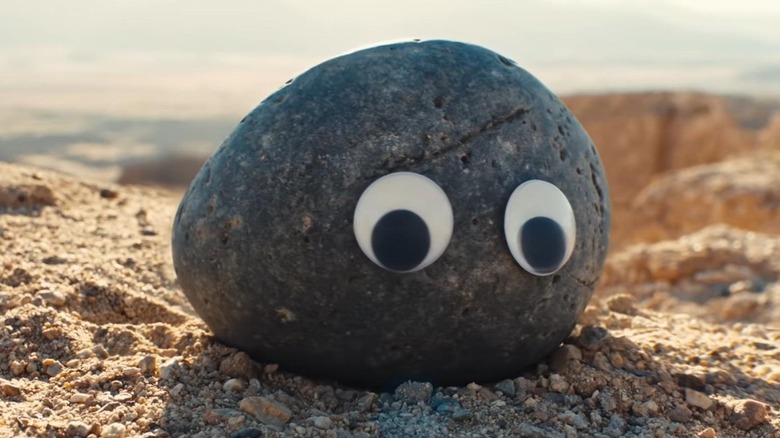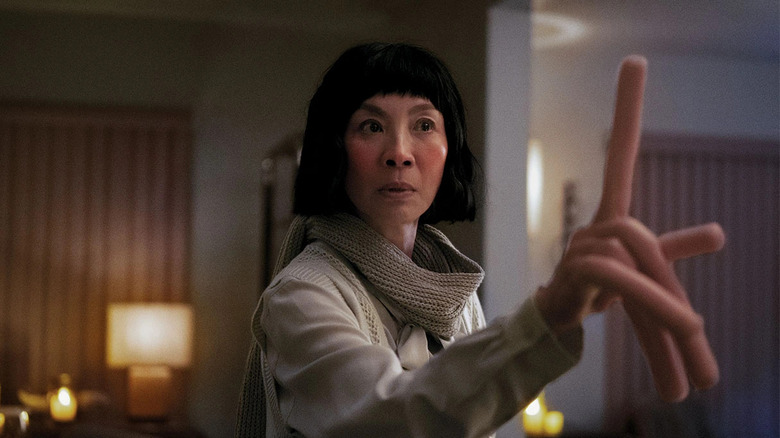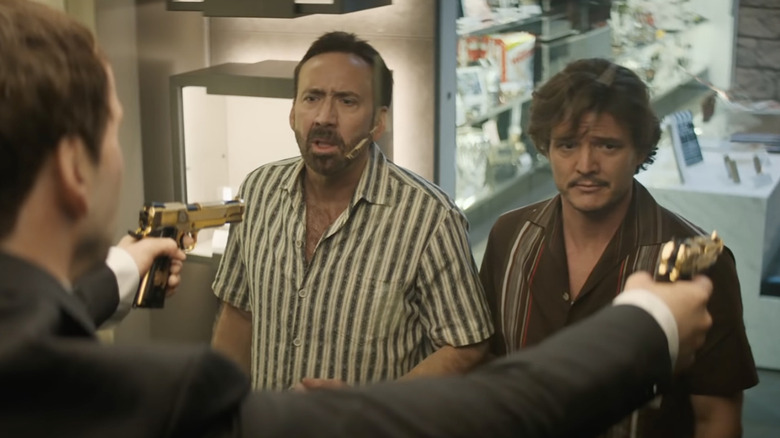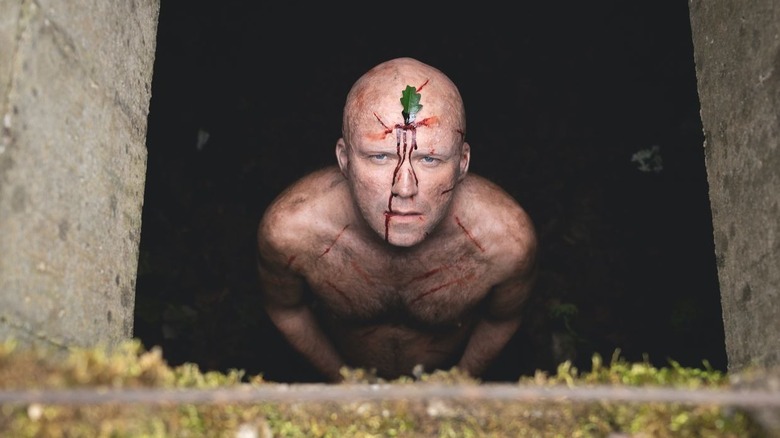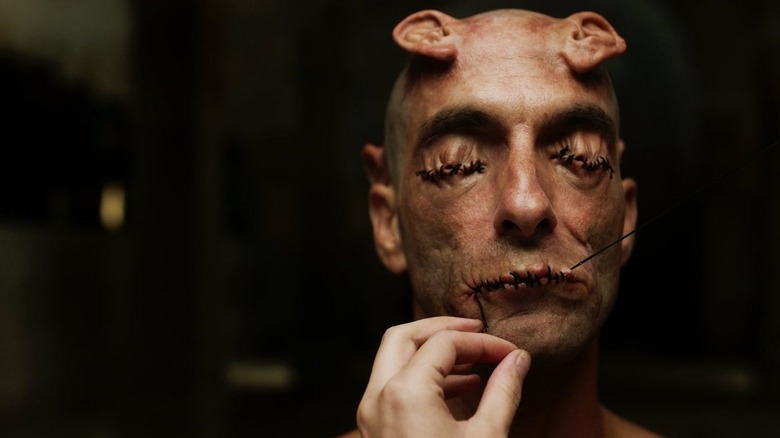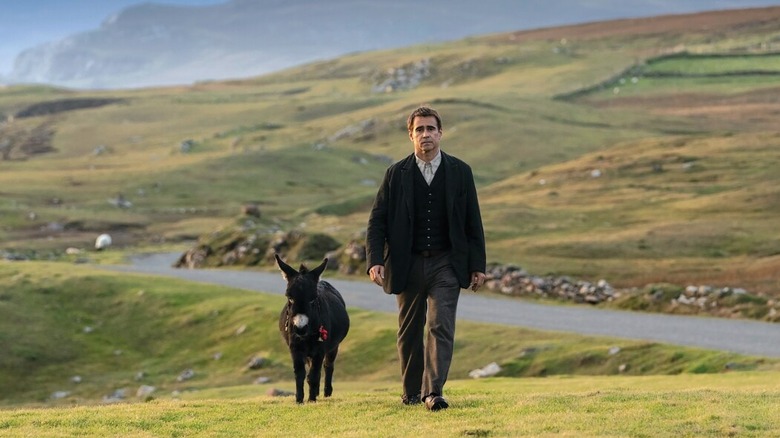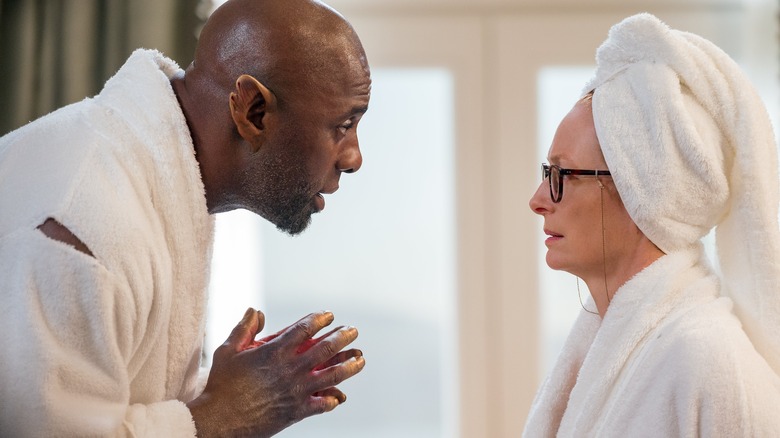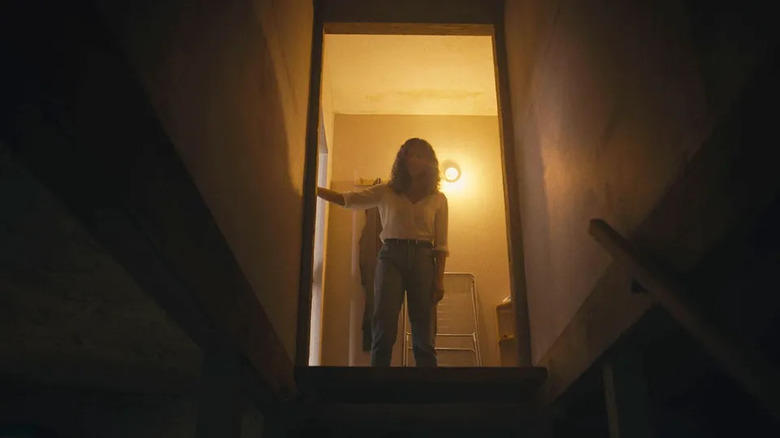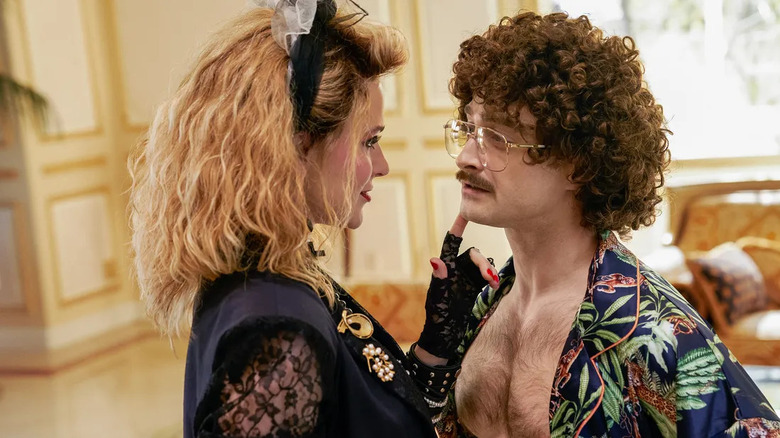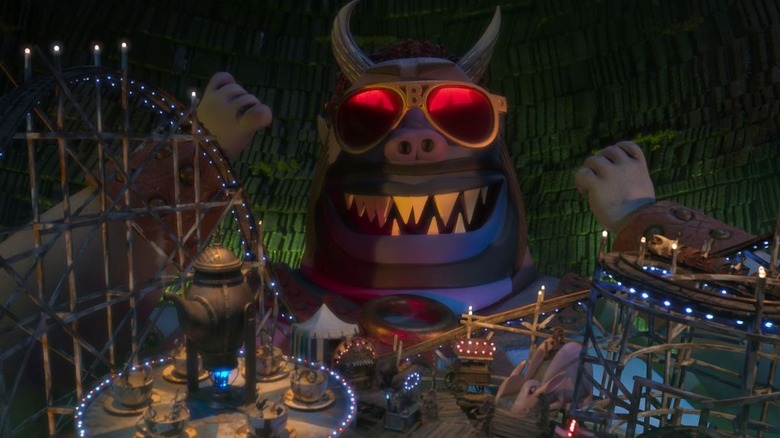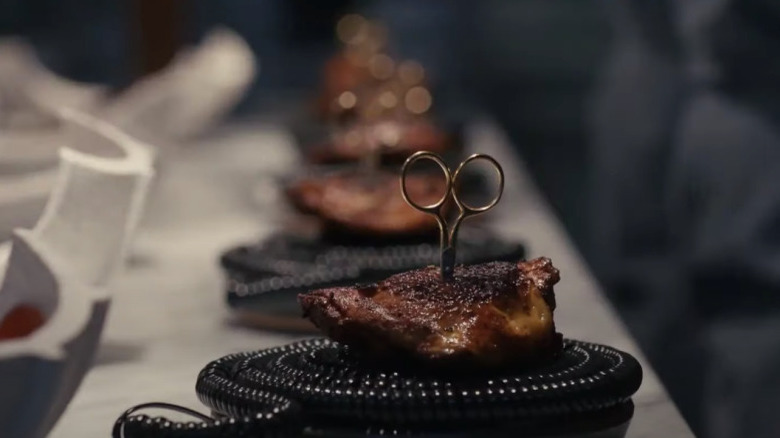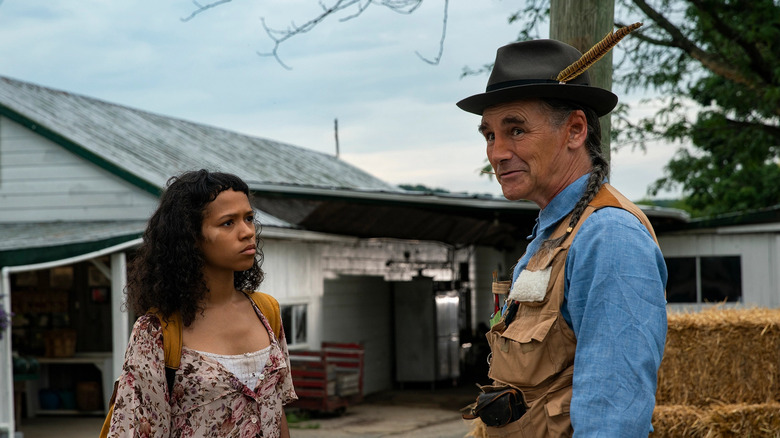The Weirdest Movies Of 2022
For all the franchises, remakes, and sequels that dominate Hollywood's release schedules, there are still movies, big and small, that take massive creative risks. These movies don't merely attempt to meet their audience's expectations; they seek to push viewers out of their comfort zones and tell stories that expand their minds, broaden their tastes, and force them to feel the full spectrum of their emotions. Such endeavors aren't always entirely successful, but there's value even in the thrown darts that miss the board altogether, let alone the bullseye.
With horror ascendent, multiverses multiplying, and comedic sensibilities as niche and varied as ever, 2022 welcomed a healthy crop of peculiar films. A few of the entries on this list stand might get some major award nominations, and few even managed to do big business at the box office despite their hard-to-sell premises. Others came and went, but are hidden gems to be discovered and enjoyed on streaming platforms when you're in the mood for something out of the ordinary. Some are deadly serious, some have their tongues firmly planted in their cheeks, but most mess with comedy and tragedy as freely as they mess with all the other conventions of traditional storytelling... which is to say, when you press play on any of these 12 movies, you're in for some dropped jaws, raised eyebrows, and confounded stares.
Everything Everywhere All At Once
One of the weirdest movies of the year has also been one of the most successful, critically and commercially speaking. "Everything Everywhere All At Once" holds one of 2022's highest Rotten Tomatoes scores (95%), and has made more than $100 million at the box office, quadrupling its $25 million budget. It's also a favorite in the awards season horserace. Not bad for a movie that features, among other things, sentient rocks and hot dog fingers.
"Everything Everywhere All At Once" follows a woman named Evelyn who got married and moved to the United States to open a laundromat, against her Chinese family's wishes. Now in middle age with a rebellious adult daughter of her own, and with her marriage and business falling apart, Evelyn's finds herself in the midst of a crisis about her life choices. But she soon discovers her personal problems — namely, that the IRS is after her and that her daughter, Joy, is queer — pale in comparison to the black hole in the center of an Everything Bagel that's about to destroy the entire multiverse. That's right...like the "Doctor Strange" sequel, "Everything Everywhere All At Once" is a multiverse movie, and it's a thoroughly original and inventive one at that.
With deep but focused themes, unforgettable absurdist imagery, and incredibly adaptable actors (Michelle Yeoh, Stephanie Hsu, Ke Huy Quan, and Jaime Lee Curtis all play multiple variants of their Alpha characters), "Everything Everywhere All At Once" is the rare out-on-a-limb movie that's nevertheless so relatable, it finds itself at the center of the culture.
The Unbearable Weight of Massive Talent
Another excellent film with a long title, "The Unbearable Weight of Massive Talent" unfortunately didn't find a particularly wide audience. This meta screwball comedy about Nicolas Cage's career is one of the funniest movies of the year and it gives the self-aware actor the opportunity to do some of his best comedic work to date. A desperate Nic Cage is embarrassing himself at industry lunches and even at family functions trying to get his star back on track. He's about to retire when his agent calls him to tell him a billionaire in Mallorca would like to pay him a million dollar fee just to attend his birthday party.
That billionaire turns out to be suspected arms dealer Javi Gutierrez (a phenomenal Pedro Pascal), who's also the world's biggest Nicolas Cage super fan. Cage's initial reluctance melts away as he and Javi become besties over their shared passion for cinema. But, this is a list of weird movies, and what makes "The Unbearable Weight of Massive Talent" weird is how the audience is never quite sure if what they're watching is a movie or a movie within a movie or something that's just going on in the mind of Nicolas Cage. The film has a blast playing with genre tropes and is at its best when poking fun at Hollywood itself. Physical gags and non-sequitur jokes abound. But for all its trippiness (including a hilarious tripping sequence), "Massive Talent" is also one of the best and most earnest buddy films in recent memory.
Men
Novelist, screenwriter, and director Alex Garland ("Ex Machina," "Annihilation") is one of our leading purveyors of weird content. His latest film, "Men," might be his strangest effort yet. Garland's stories are usually futuristic and dystopian, and interested in the inherent conflict between technology and nature. In contrast, "Men" is provincial and personal, and interested in the inherent conflict between women and, well, men.
A woman named Harper (Jessie Buckley) decides to rent an English country house following the death of her husband; she's haunted by her past and needs time alone to recover. But the village she chose for her prolonged holiday isn't quite what she expected and it turns out to be the last thing she needed. Her landlord, Geoffrey, seems a bit odd, and she begins to suspect that a possibly homeless and definitely naked man is stalking her, since she sees him in the woods and then again in her garden. Though the locals are helpful to an extent, Harper isn't sure she can trust her own mind, as she realizes all the male villagers — from her landlord to the vicar to a little boy — all look identical (and like Rory Kinnear, who plays nearly every other role). To say much more would give away this emotional horror story's sharpest hook. "Men" is tense and off-kilter throughout, but it concludes with one of the most visceral, metaphorical, and bizarre sequences ever committed to film.
Crimes of the Future
Speaking of body horror, the father of the genre, David Cronenberg, released a new movie at the 2022 Cannes Film Festival that's his most explicitly about the body yet. It's just as thought-provoking, visually compelling and stomach-churning as his previous work. "Crimes of the Future" imagines a future in which the human body has organically evolved along with the medical technology that we use to extend natural life. For most people, this means they no longer have to experience pain or illness —but others developed more specific mutations. Saul Tenser (Viggo Mortenson) still feels pain, but can grow organs within his own body, which he and his partner Caprice (Léa Seydoux) demonstrate as traveling performance artists in a type of public surgical theater.
Meanwhile, the government is trying to regulate mutation and its affect on society with bureaus like the National Organ Registry. One of their investigators, Timlin (Kristen Stewart) becomes involved with Tenser, who decides to infiltrate an extremist group that modifies their own bodies so as to be able to consume and process plastics. "Crimes of the Future" is, like the body of a Frankenstein's monster, something stitched together from existing genres that comes back to life as something darker, pulpier, and sadder. Cronenberg has made a series of bold moving images about bodily functions, and furthermore, he's using them to ask bold questions about bodily autonomy.
The Banshees of Inisherin
Martin McDonagh's "The Banshees of Inisherin" might seem like a quaint dramedy about the falling out of two friends on a remote Irish isle — and to some extent, that's what it is. After decades of constant companionship, Colm (Brendan Gleeson) tells Pádraic (Colin Farrell) that he doesn't want to speak to him or spend time with him anymore, which Pádraic can't understand or accept. His too-smart-for-the-time-and-place sister (Kerry Condon) and a simple-minded and slightly annoying younger neighbor (Barry Keoghan) try to help him process this major life change, all against a backdrop of thatch-roofed cottages, room temperature ale, cute-as-a-button farm animals, and the cold mist of the nearby sea. But fans of McDonagh, whose previous work includes "In Bruges" and "Three Billboards Outside Ebbing, Missouri," will suspect something crazy must be lying in wait underneath the surface of all the polite normality.
"The Banshees of Inisherin" isn't as random or vulgar as McDonagh can sometimes be. It's admittedly tame (though no less powerful) compared to the rest of his filmography, and buoyed by strong performances. But, maybe because of that, those who go in expecting "Seven Psychopaths" style gleeful sex and violence will likely be even more taken aback by the extremely specific and downright gross way that Colm escalates his feud with Pádraic. In the end, one of the most well-reviewed movies of the year also contains one of the sickest turns.
Three Thousand Years of Longing
It's been seven years since George Miller shocked and awed audiences with the weird, wild, and wonderful "Mad Max: Fury Road." He has a prequel, "Furiosa," in the works, but in between trips to everybody's favorite post-apocalyptic desert wasteland, Miller took some time to tell a gentler though still epic and unusual story. "Three Thousand Years of Longing" stars Tilda Swinton as Alithea, an academic who studies the anthropological history of storytelling. While at a conference in Turkey, Alithea unleashes a Djinn (Idris Elba) from its bottle. Rather than partake in the wishes she's granted since she's skeptical she'll actually receive what it is she desires, she wants to hear more about the Djinn himself.
From there, "Three Thousand Years of Longing" hops and skips throughout time and world culture. Genie-in-a-lamp stories are, of course, nothing new and thus not particularly weird, and the film uses its familiar conceit and structure (Alithea's gotta make those three wishes eventually, right?) to explore familiar themes such as the human cravings for love, knowledge, and power. What's atypical about this version is the sheer earnestness with which Miller blends realism and mysticism, and the ambitious literary-ness with which Miller approaches those themes. If you thought Will Smith's Genie with his crush on Nasim Pedrad was novel, you're probably not prepared for "Three Thousand Years of Longing."
Barbarian
There are horror movies that rely on the hallmarks of the genre, from demonic spirits to sexy vampires to scary clowns to dudes in masks, and so on. But there are also horror movies that scare the living daylights out of us because we can't possibly imagine what could be coming next. 2022's surprise horror hit, "Barbarian," is one of these. It's eventual big bad might not be as iconic as Michael Myers or Pennywise, and its premise can't be summed up in a pithy, poster-worthy sentence. In fact, the most discomfiting thing about "Barbarian" is that viewers aren't really sure what brand of horror movie they're watching from minute to minute. Is the house haunted? Is one of the normies really a serial killer? Is it meant to be romantic? Funny? Who knows!
Writer and director Zach Cregger (an alum of the sketch group Whitest Kids U Know), that's who. His debut feature begins as two strangers — Georgina Campbell's Tess and Bill Skarsgård's Keith — arrive at a creepy rental house that the owner has mistakenly double-booked. It's a fertile setup for a traditional horror plot, but "Barbarian" isn't a traditional horror movie. Cregger delights in stringing the audience along and playing with their expectations. "Barbarian" appears on this list not only because of the way it subverts horror tropes, but because its big reveal is jaw-droppingly outlandish. Like "Everything Everywhere All At Once," it went over like gangbusters with critics, who ranked it among the best horror movies of a strong 2022, and with audiences, who flocked to theaters and earned the film an unexpected $40 million haul.
Spiderhead
Netflix's "Spiderhead" is the first movie to be adapted from the works of George Saunders. The acclaimed author is famous for his playful and creative writing style, even when tackling serious subject matter. It'd be a challenge to capture his worlds; his characters often take the form of children, animals, and non-human entities, and the action largely takes place in their minds. "Spiderhead" has the benefit of an all-human, all-adult cast, but the mind is still the main point.
The title refers to a private prison-slash-pharmaceutical research facility run by hip, cool CEO-bro, Steve (Chris Hemsworth), who has struck a deal to commute the sentences of convicts who volunteer to be his guinea pigs. A "Mobipak" is installed in their bodies, from which Steve can flood their systems with experimental mood altering drugs. We're not talking Prozac, Ritalin, or any substance which might have a slight impact on depression or attention. The Mobipaks allow Steve to control the prisoners' moods as if they're skins in a video game. They've consented because, like our protagonist Jeff (Miles Teller), their pasts are traumatic and they don't want to feel what they currently feel.
"Spiderhead" is as madcap as it is menacing. It has relevant things to say about corporate prisons and healthcare systems, as well as memory and mental health. But Hemsworth plays Steve mostly for laughs, the drugs themselves have names like Darkenfloxx, and after keeping you on the edge of your seat in its second half, the whole thing ends with a bang that'll make you scream, laugh, and think, in no particular order.
Weird: The Al Yankovic Story
"Weird: The Al Yankovic Story" didn't make this list only because of its title. As any biopic about the greatest living parody songwriter would necessarily have to be, "Weird" is a little off its rocker. The biopic genre itself has become so overdone that there have been more parodies of these types of movies as of late than genuine, serious attempts to revive the biopic. "Weird" owes at least half of its schtick to 2007's cult classic "Walk Hard: The Dewey Cox Story," but it's got a few of its own tricks up its sleeve. For starters, Daniel Radcliff's casting is inspired. The actor has sought out aggressively weird roles ("Swiss Army Man," for example) in his post-"Harry Potter" career, and he brings both the ironic energy and the theater kid try-hard-ness that the movie needs to hit its tonal target.
That tone is the strangest thing about "Weird." If "Walk Hard" and "The Unbearable Weight of Massive Talent" had a baby, it would be this movie. To properly satirize its marks, "Weird" – which premiered at the Toronto Film Festival and won the Midnight Madness award — tells its story as dramatically as possible and in chronological order. Just like Johnny Cash, Ray Charles, and others before him, Al can chart his life from his difficult childhood to plucky upstart moment, from meteoric rise to self-indulgent fall. What's different is that what happens to Weird Al Yankovic in the movie isn't remotely what happened to Weird Al Yankovic in real life, which should be evident by the ending, by which points things have really gotten out of hand between Al and Evan Rachel Wood's completely fictionalized version of Madonna.
Wendell & Wild
"Wendell & Wild" comes from the imagination and the painstaking stop-motion animation of Henry Selick, with a screenplay co-written by Academy Award winner Jordan Peele. Selick ("The Nightmare Before Christmas" and "Coraline") and Peele ("Get Out," "Us," and "Nope") both excel at telling dark but relatable outside-of-the-box stories in visually exciting ways, and the result of their collaboration for Netflix is as kooky, chaotic, slightly deviant, and yet still heartfelt.
The only thing that detracts from "Wendell & Wild" is that there might be too much story in this story. Any attempt at a plot description fails to properly capture its scope, not to mention its singular vibe — but let's try. After the death of her parents in an accident she thinks is her fault, a girl named Kat becomes a juvenile delinquent and is eventually sent to a corrupt Catholic girls school. While she's busy trying to make a deal with some of the Devil's minions (Peele and Keegan-Michael Key) to bring her parents back to life, a couple of land developers attempt to turn her economically depressed hometown into the site of their latest private prison. "Wendell & Wild" has really important things to say about how marginalized people are affected by politics and business, but it's also kind of a zany kids movie with gags about magical nose hair cream and teddy bears that speak in demonic tongues. It's neither Selick nor Peele's best work, but it's an admirably big and bizarre swing.
The Menu
"The Menu" lambasts high-end foodie culture and the people who can afford to be obsessed with it: the ultra rich. Some viewers incorrectly guessed the film's big twist might be that patrons of Hawthorne — the movie's fictional restaurant — might actually be eating the rich for a thousand bucks a plate, but "The Menu" wouldn't stoop to so cheap and obvious a trick.
The setup is fairly clear from the trailer. A couple (Nicholaus Hoult and Anya Taylor-Joy) head out for their expensive dinner date; he's into it, and she's not. The establishment, which only seats 12 guests per evening, is on a remote island, and the celebrity chef (Ralph Fiennes) who leads an unflinchingly dedicated staff serves only and exactly what he pleases, made exclusively from locally harvested ingredients. Each story beat is served in combination with a food course, which is a clever and useful narrative structure upon which director Mark Mylod and screenwriters Seth Reiss and Will Tracy build their story. It's a tasting menu, if you will.
Like a tasting menu, the film offers the moviegoer a variety of flavors. The trailer also makes it clear that this is a horror comedy, which means something is about to go wrong despite all the careful planning and artful plating, and we're meant to both laugh and scream. "The Menu" is full of surprises that are not only weirder but darker, sillier, and more bitter than audiences might expect, all progressing toward its visually astounding and absolutely absurd grand finale.
Bones and All
"The Menu" isn't about cannibalism, but the latest indie romantic drama from Luca Guadagnino and Timothée Chalamet, is! However, with its prestigious pedigree (Mark Rylance and Michael Stuhlbarg also appear alongside rising star Taylor Russell), and gauzy marketing, some of the people who wandered into theaters to see "Bones and All" may not have realized just how much about cannibalism is was.
Maren (Taylor Russell) and Lee (Chalamet) are disaffected teenagers who became cannibals, but not really by choice. They meet, fall in love, take to the road, and "Bones and All" fully expects us to root for them as they stop to murder and digest people every once in awhile. A cameo by Stuhlbarg as a fellow transient cannibal who isn't nearly as cute or sympathetic is pretty weird, but nothing compares to Rylance's Sully. Everything the character says, does, and wears is so incomprehensibly weird, people may not believe what they're hearing and seeing. Sully speaks in third person, has a nifty little feather in his cap, collects enamel pins and human hair, and eats people on while all fours in his tighty-whities... and that's just what we learn about him in his first few minutes of screen time. "Bones and All" has become something of a critical darling and awards hopeful, so Rylance might just take home some hardware for what's arguably the weirdest performance in Hollywood history.
